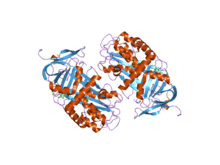Globuline liant la thyroxine
La globuline liant la thyroxine (TBG, de l'anglais : thyroxine-binding globulin) est l'une des trois classes de protéines transporteuses des hormones thyroïdiennes dans le sang, les deux autres étant la transthyrétine (TTR) et les albumines sériques. La TGB est celle des trois qui possède l'affinité la plus élevée pour la thyroxine (T4) et la triiodothyronine (T3), mais, contrairement à ces deux autres classes de protéines, elle ne possède qu'un seul site liant la T4 ou la T3 par molécule. C'est également celle dont la concentration dans le sang est la plus faible. Malgré cela, la TBG transporte l'essentiel de la T4 dans le sang. Le taux sanguin de T4 et de T3 est si faible que la TBG est rarement occupée à plus de 25 % par une molécule d'hormone thyroïdienne.
La TBG est produite essentiellement dans le foie comme une protéine de 54 kDa. D'un point de vue génomique, la TBG est une serpine, mais elle ne possède pas de fonction inhibitrice comme de nombreuses autres protéines de ce type.
Notes et références
- (en) Aiwu Zhou, Zhenquan Wei, Randy J. Read et Robin W. Carrell, « Structural mechanism for the carriage and release of thyroxine in the blood », Proceedings of the National Academy of Sciences of the United States of America, vol. 103, no 36, , p. 13321-13326 (lire en ligne) DOI:10.1073/pnas.0604080103
- (en) Cheng SY, « Partial amino acid sequence of human thyroxine-binding globulin. Further evidence for a single polypeptide chain », Biochem. Biophys. Res. Commun., vol. 79, no 4, , p. 1212–8. DOI:10.1016/0006-291X(77)91135-4
- (en) Shirotani T, Kishikawa H, Wake N, et al., « Thyroxine-binding globulin variant (TBG-Kumamoto): identification of a point mutation and genotype analysis of its family », Endocrinol. Jpn., vol. 39, no 6, , p. 577–84.
- (en) Bertenshaw R, Sarne D, Tornari J, et al., « Sequencing of the variant thyroxine-binding globulin (TBG)-San Diego reveals two nucleotide substitutions », Biochim. Biophys. Acta, vol. 1139, no 4, , p. 307–10.
- (en) Bertenshaw R, Takeda K, Refetoff S, « Sequencing of the variant thyroxine-binding globulin (TBG)-Quebec reveals two nucleotide substitutions », Am. J. Hum. Genet., vol. 48, no 4, , p. 741–4 (PMCID 1682945).
- (en) Imamura S, Mori Y, Murata Y, et al., « Molecular cloning and primary structure of rat thyroxine-binding globulin », Biochemistry, vol. 30, no 22, , p. 5406–11. DOI:10.1021/bi00236a012
- (en) Janssen OE, Takeda K, Refetoff S, « Sequence of the variant thyroxine-binding globulin (TBG) in a Montreal family with partial TBG deficiency », Hum. Genet., vol. 87, no 2, , p. 119–22. DOI:10.1007/BF00204164
- (en) Yamamori I, Mori Y, Seo H, et al., « Nucleotide deletion resulting in frameshift as a possible cause of complete thyroxine-binding globulin deficiency in six Japanese families », J. Clin. Endocrinol. Metab., vol. 73, no 2, , p. 262–7. DOI:10.1210/jcem-73-2-262
- (en) Li P, Janssen OE, Takeda K, et al., « Complete thyroxine-binding globulin (TBG) deficiency caused by a single nucleotide deletion in the TBG gene », Metab. Clin. Exp., vol. 40, no 11, , p. 1231–4.
- (en) Waltz MR, Pullman TN, Takeda K, et al., « Molecular basis for the properties of the thyroxine-binding globulin-slow variant in American blacks », J. Endocrinol. Invest., vol. 13, no 4, , p. 343–9.
- (en) Mori Y, Takeda K, Charbonneau M, Refetoff S, « Replacement of Leu227 by Pro in thyroxine-binding globulin (TBG) is associated with complete TBG deficiency in three of eight families with this inherited defect », J. Clin. Endocrinol. Metab., vol. 70, no 3, , p. 804–9. DOI:10.1210/jcem-70-3-804
- (en) Takeda K, Mori Y, Sobieszczyk S, et al., « Sequence of the variant thyroxine-binding globulin of Australian aborigines. Only one of two amino acid replacements is responsible for its altered properties », J. Clin. Invest., vol. 83, no 4, , p. 1344–8 (PMCID 303827). DOI:10.1172/JCI114021
- (en) Mori Y, Seino S, Takeda K, et al., « A mutation causing reduced biological activity and stability of thyroxine-binding globulin probably as a result of abnormal glycosylation of the molecule », Mol. Endocrinol., vol. 3, no 3, , p. 575–9. DOI:10.1210/mend-3-3-575
- (en) Flink IL, Bailey TJ, Gustafson TA, et al., « Complete amino acid sequence of human thyroxine-binding globulin deduced from cloned DNA: close homology to the serine antiproteases », Proc. Natl. Acad. Sci. U.S.A., vol. 83, no 20, , p. 7708–12 (PMCID 386790). DOI:10.1073/pnas.83.20.7708
- (en) Janssen OE, Chen B, Büttner C, et al., « Molecular and structural characterization of the heat-resistant thyroxine-binding globulin-Chicago », J. Biol. Chem., vol. 270, no 47, , p. 28234–8. DOI:10.1074/jbc.270.47.28234
- (en) Mori Y, Miura Y, Oiso Y, et al., « Precise localization of the human thyroxine-binding globulin gene to chromosome Xq22.2 by fluorescence in situ hybridization », Hum. Genet., vol. 96, no 4, , p. 481–2. DOI:10.1007/BF00191811
- (en) Miura Y, Mori Y, Yamamori I, et al., « Sequence of a variant thyroxine-binding globulin (TBG) in a family with partial TBG deficiency in Japanese (TBG-PDJ) », Endocr. J., vol. 40, no 1, , p. 127–32. DOI:10.1507/endocrj.40.127
- (en) Hayashi Y, Mori Y, Janssen OE, et al., « Human thyroxine-binding globulin gene: complete sequence and transcriptional regulation », Mol. Endocrinol., vol. 7, no 8, , p. 1049–60. DOI:10.1210/me.7.8.1049
- (en) Akbari MT, Kapadi A, Farmer MJ, et al., « The structure of the human thyroxine binding globulin (TBG) gene », Biochim. Biophys. Acta, vol. 1216, no 3, , p. 446–54.
- (en) Mori Y, Miura Y, Takeuchi H, et al., « Gene amplification as a cause of inherited thyroxine-binding globulin excess in two Japanese families », J. Clin. Endocrinol. Metab., vol. 80, no 12, , p. 3758–62. DOI:10.1210/jc.80.12.3758
- (en) Carvalho GA, Weiss RE, Vladutiu AO, Refetoff S, « Complete deficiency of thyroxine-binding globulin (TBG-CD Buffalo) caused by a new nonsense mutation in the thyroxine-binding globulin gene », Thyroid, vol. 8, no 2, , p. 161–5. DOI:10.1089/thy.1998.8.161
- Portail de la biochimie
- Portail de la biologie cellulaire et moléculaire
- Portail de la médecine
- Portail de l’hématologie
